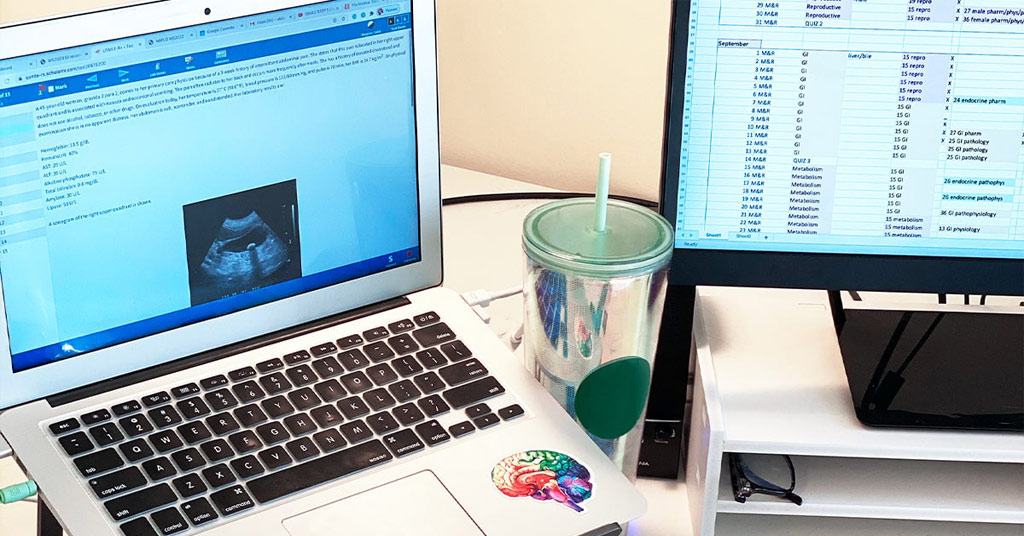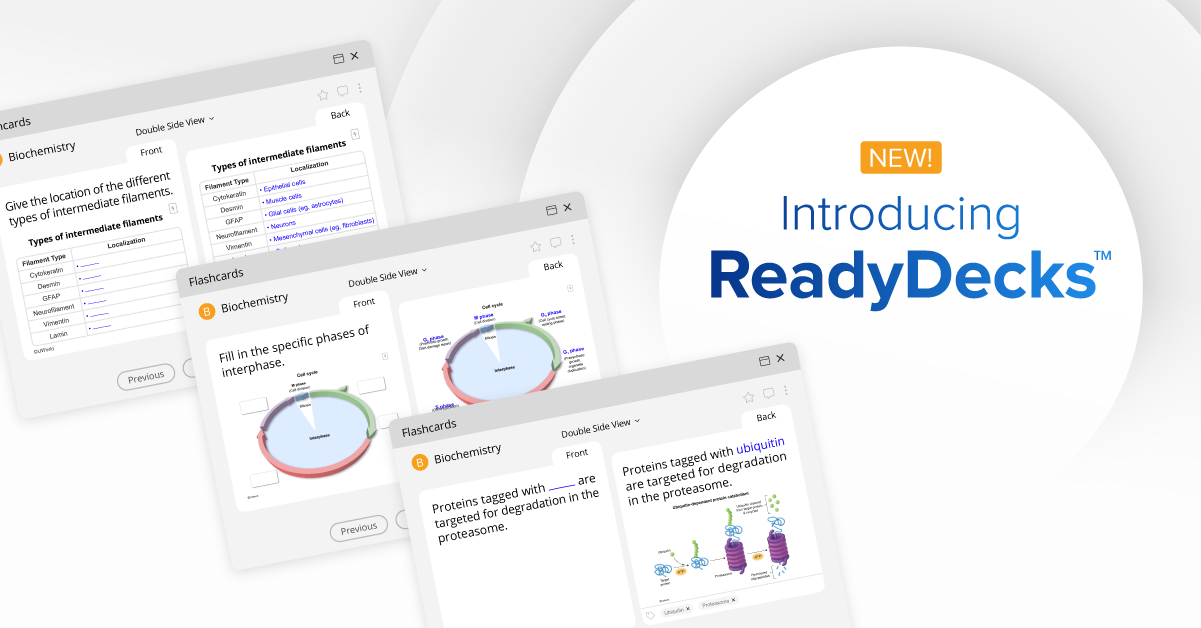By Abi Felsted
Starting my second year of medical school felt like a rite of passage in and of itself. Having already reveled in the white coat ceremony, bonded with classmates, and successfully passed a year of rigorous academic courses, I felt I had a certain cachet, plus a much higher confidence level than just one year before.
However, I knew that medical school would grow increasingly difficult with each new step and that I would have to shift my priorities to rise to the challenge. Entering my first year of medical school (M1), my goal had been simple: pass the classes. But now, having attained greater confidence, I started to think about other goals beyond passing, like truly understanding the principles of what I was studying, scoring higher on exams, and beginning preparation for USMLE® Step 1.
Throughout intensive university courses, graduate entry exams, and even M1, I learned that the only way to actually do better is to practice, just as I had as a water polo player and a competitive debater in high school through thoughtful and thorough rehearsal each day. Regular sessions of sitting across from my debate partner and giving examples of what we might encounter on tournament day helped me win a national championship. Now starting my second year of medical school (M2), I wanted to apply a similar strategy and practice to my medical studies.
How I Decided When To Start Using UWorld
During the summer before M2, I began doing a lot of research on Step 1 study strategies. Without a doubt, the most frequent advice was that I should practice like it’s the real thing. Through both in-person and online research, I also learned that UWorld is closest to the real thing. Even when Reddit was split on the timing—whether to start UWorld at the beginning of M2 or to wait until a dedicated USMLE Step 1 study period—UWorld is considered a “must-have” resource across the board.
I also found conflicting advice on how to use UWorld. Many students said it was important to learn everything in UWorld as a textbook (even if that involved repeating questions). Others suggested that regularly seeing new questions was most important. Ultimately, I decided to follow the age-old advice that “repetition is the father of all learning,” which conforms with the theory of Swedish psychologist Dr. K. Anders Ericsson that it takes 10,000 hours of practice to achieve mastery of a subject. Also, every third- and fourth-year medical student I talked to told me that it’s important to see all of UWorld’s practice questions at least once, but preferably twice.
Ultimately, I decided to start UWorld alongside M2 classes a few weeks into the school year. This decision allowed me to benefit from UWorld’s spaced repetition feature over the long term rather than in a more compressed timeframe. My strategy was to begin with questions on material I had recently learned in class (from a few days up to two weeks before). This way, I was practicing information I presumably already understood.
To plan my question schedule, I created an Excel spreadsheet at the beginning of every unit. I took the number of available questions per unit and divided it by the number of days I planned to practice questions. I found that the spreadsheet helped keep me accountable, and checking off the boxes for each unit was quite rewarding.
How I Fit UWorld Into My Day
In my general daily schedule, my first task is to do what I need for lectures. Class attendance is optional at my medical school, so I don’t typically attend, but I do my best to look through the material covered on any given day, so I know what to study on my own. I then create a to-do list, which often includes watching videos on pathology, pharmacology, and physiology from external resources.
Next, I take notes while watching these resources and put them into my USMLE Step 1 First Aid book. I do this for three reasons: 1) to keep everything in one place, 2) to create a reference resource, and 3) to focus on what is high yield. While many of my classmates save PowerPoints or keep extensive notes from class, I find that most of the information is superfluous and difficult to revisit. To see my video on taking notes in First Aid, click here; I use a code for note-taking and love being able to know exactly what to expect on the test.
After watching videos and taking notes, I spend an hour per day on my flashcards. Then, UWorld is next! Each day I do around 10-12 UWorld questions. UWorld teaches me a lot, similar to a textbook. I love how easy it is to pull up topic-specific questions on the platform and only practice what I’ve just learned. Whether I answer correctly or not, I can read through a detailed explanation that often makes more sense than my other resources.
As I go through my daily UWorld questions, I also jot down notes from UWorld into my First Aid book. Recently, I have begun incorporating the impressive new UWorld flashcards feature as well. I can easily make any sentence, table, or graphic into a flashcard, and I find flashcards to be a perfect way to stay on top of the information I learned a few days earlier.
How UWorld Has Helped Me
When I first began doing UWorld questions, I struggled to get through even ten questions a day. It felt like a lot of work, and it was very intensive. However, over time, I’ve built up a lot of stamina. Now, I can do about 15-20 UWorld questions a day!
In summary, then, here’s how UWorld has improved my life:
1. I have become incredibly good at navigating NBME-style questions. I know exactly the types of questions they like to pose, both in terms of formatting and the intention behind the question. Becoming adept at the NBME style has improved my test-taking skills immensely.
2. I’ve significantly improved the way I study because, by taking practice questions, I can tell early on which information is high yield. This insight is something that one cannot in any other way than by practicing UWorld! It has helped me sift through material more efficiently, thus improving my study days.
3. I am getting great at applying my knowledge. As a previously terrible test taker (combine impatience, dyslexia, and sheer angst, and you don’t get a competent standardized exam performance), I’ve been super excited to see my improvement. Throughout our most recent units—Metabolism & Reproduction and Cardio/Respiratory/Renal—my exam scores have been better than in M1! Plus, because UWorld’s questions are similar in design to those I see on my class exams, my tests end up feeling like just another practice session.
While I have not yet taken USMLE Step 1 and don’t plan to advise on it until I have taken the test, I can say with certainty that starting UWorld in the early part of M2 has really helped my academic performance, my confidence, and my organization. I’ve found that when it comes to repetition and learning/retaining material in medical school, there is no shortcut; you need to see things over and over and put in the work to keep the information fresh. UWorld is, without any doubt in my mind, a must-have resource!
Give yourself the best chance to succeed on the USMLE exams when you prepare with UWorld’s suite of USMLE learning tools.




